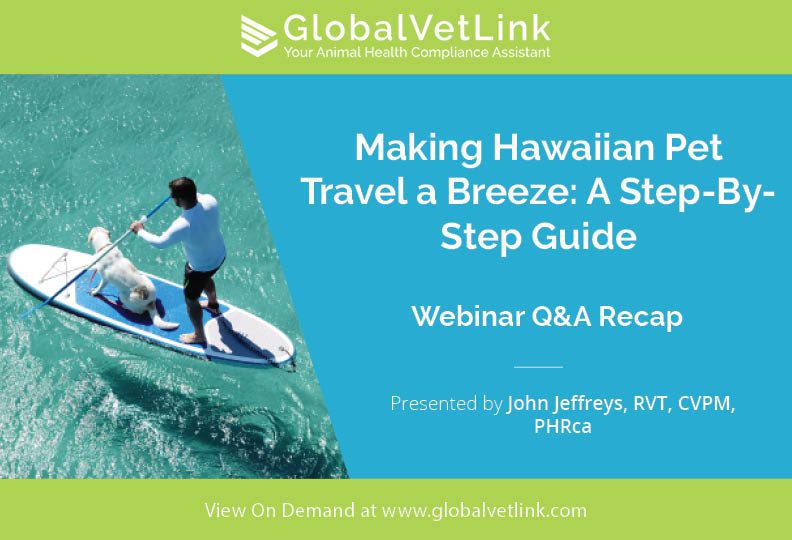This is going to vary depending on your location. I would say that based on the time involved in these, that the cost of issuing a Hawaii CVI should be 1.5 times your exam fee. If your exam fee is $50, then the health certificate fee should fall around $75. The total for that final visit should be $125+ the cost of any other services/treatments performed.
There are some clinics who do obtain a deposit (or prepayment) and I’m not opposed to it as long as the clinic has a protocol/workflow that works for obtaining the payment each and every time.
I recommend total transparency. Something along the lines of, “I understand your plan is to leave in about 3 weeks, have you looked at the necessary requirements to travel with your pet? We are happy to assist you with the process, but keep in mind that it typically takes 4+ months to complete these requirements (as certain steps cannot be rushed or expedited). Did you still want to schedule that appointment to start the process?”
Hawaii has no regulations related to where animals are transported on planes. Transportation location is based on airline policy. Hawaii regulations apply only after the flight has landed in the state.
Information for Hawaii specifically can be found on the State of Hawaii Plant Industry Division website.
No, the animal must be rabies vaccinated, but no other core vaccines are required for entry.
All incoming pets are subject to import regulations, regardless of the method of transport. Private planes must also declare when there are pets on board. The flight crew is responsible for ensuring pets are presented for inspection. That is a carrier responsibility, not a D.V.M responsibility. (HAR 4-29-6)
Typically, this pet would not be eligible for direct airport release and would be subject to the 5-day-or-less program (until that 10 day period has been met). I would have the client contact the AQS to be advised.
I have yet to encounter this (fortunately), but I would direct the client back to the airline to see what their specific policy is on this (and if there is any allowable grace period).
Yes – the timeline applies to the two qualifying rabies vaccinations regardless of the number of rabies vaccinations in a pet’s lifeline. Pet must have 2 rabies vaccinations that fit the qualifying conditions. Most recent given 30 days or more prior to entry and 30 days or more from the prior vaccination. The previous vaccination needs to be administered 30 days or more from the most recent. More information on this requirement can be found on Hawaii’s Animal Quarantine Information Page (Updated).
Yes – the pet owner would apply for release in Honolulu. Once qualified and released on Oahu, a pet can travel statewide without additional requirements.
The CVI does not need to be submitted with the AQS-279 form, rabies documents and FAVN results. Those documents will need to be submitted 30 days ahead of arrival. The pet parent will need to travel with the CVI and will present it at the airport upon arrival.
The AQS-279 form and rabies certificates are required at least 30 days before arrival in Kahului, Kona, and Lihue. However, the inspection of the animal must be done within 14 days of arrival to Hawaii.
The Certificate of Veterinary Inspection (CVI) portion of the Hawaii Pet TravelPass for the neighboring islands will be in the “Awaiting Inspection” tab, allowing them to complete the CVI within the required timeframe to send with the client.
Honolulu arrival:
Certificate of Veterinary Inspection
2 most recent rabies certificates
AQS-279 import form
FAVN results document (if available)
Other Islands arrival:
2 most recent rabies certificates
AQS-279 import form
FAVN results document (if available)
*Pet parents will need to travel with the Certificate of Veterinary Inspection and present it at the airport upon arrival.
Payment must be sent with documentation to the Animal Quarantine Station.
No – electronic signatures are allowed.
Microchip number on the rabies certificate is not required. Required information includes, vaccine manufacturer name, lot number, lot expiration date, duration of vaccination, and DVM signature. A microchip number would be helpful if recently adopted pets may have changed names. This helps demonstrate continuity of coverage for the pet that may have a different name on the certificate vs the Dog and Cat Import form.
If the owner does not have records that show when the microchip was implanted, we will record the first date that we verified the placement of the microchip.
Kansas State University, Auburn University and the Department of Defense Food Analysis and Diagnostic Lab.
Regulations do not specify when the FAVN test can be performed. It is only necessary to have a passing titer in the required timeline. It is strongly recommended that owners discuss optimal timelines with the DVM to ensure titer levels are met. Lack of a passing titer will disqualify a pet from direct airport release.
The FAVN “form” is the lab submittal form that is submitted with the blood to the lab.
The pet would then enter into quarantine until the results arrive to the state.
FAVN titer tests average around 6-8 weeks to process.
A veterinarian must treat the pet for ticks with a product containing a long-acting product labeled to kill ticks (Revolution® is not acceptable) within 14 days of arrival, and the product name and date of treatment must be recorded on the pet’s health certificate.
Yes.
This needs to be administered by the veterinarian.
As of May 17, 2022, these states no longer accept APHIS 7001 forms for small animal movement: AL, AZ, CO, GA, ID, IL, IN, KS, KY, LA, MA, MD, MO, ND, NJ, NV, OK, PA, RI, WA, and WI. You can find more information on the GlobalVetLink website.
Yes, Hawaii accepts the APHIS 7001 form signed by a licensed, accredited veterinarian. Wet signature is required since this form is not digitized with a tracking number.
Currently (as of 5/24/2022), New Mexico, North Carolina, and Texas do not require health certificates for dogs or cats entering those states. However, airlines may still require health certificates for flights into those states. You can find more information on the GlobalVetLink website.
GlobalVetLink offers a subscription-based model and charges each veterinary practice a monthly subscription fee and per certificate fee. The GlobalVetLink monthly subscription is $34.95/mo and the certificate fees vary depending on the certificate type/ GlobalVetLink also offers a pay-as-you go plan, where the clinic is charged for each certificate at a higher certificate fee with no monthly subscription fee.
When you sign up for GlobalVetLink, you will create an account for your hospital/clinic. Under this account, each doctor will have their own individual profile that they log into to access the clinic’s account.
All signatures on the Pet TravelPass for Hawaii are electronically signed by the veterinarian. The only wet signature required is from the pet owner on the AQS-279 form when they print out the packet to finish and mail it in.
Yes! The GlobalVetLink team is working on bringing the other Hawaii islands into the platform. Keep an eye out for this additional service coming soon!
We recommend saving the rabies vaccination certificates to your desktop or file on your computer. When you get to the portion of the certificate where you upload the Rabies certificates, you will choose to drag or drop the saved files from your computer.
GlobalVetLink also offers International Health Certificates! Through the GlobalVetLink platform, you can create the required documentation for international travel and then submit them to USDA APHIS for endorsement, either online, through VECHS or by mail.
In the GlobalVetLink program, you can only select one species type per Certificate of Veterinary Inspection.
GlobalVetLink offers a subscription-based model and charges each veterinary practice a monthly subscription fee and per certificate fee. GlobalVetLink also offers a pay-as-you-go plan, where the clinic is charged for each certificate at a higher certificate fee with no monthly subscription fee.
On the subscription pricing model, the Hawaii Pet TravelPass costs $92/travelpass, and the per-certificate pricing model costs $115/travelpass.

